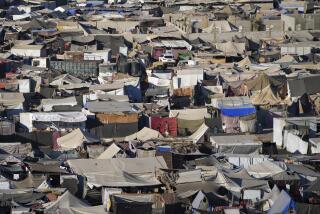On the Media: Glenn Beck’s hysterical rants about Egypt play on fear
We saw all the character traits from one figure looming over the Egypt story: the massive shows of emotion, the sketchy command of others’ views, the megalomaniacal refusal to recognize facts on the ground. And, as always, the willingness to say and do anything to command the stage for one more day.
We speak not of Hosni Mubarak, but of that other master of manipulation and misdirection, Glenn Beck.
What seemed like a joyous and hopeful turning point to most others in the media, including some of his Fox News colleagues, appeared to Beck, instead, as a foreboding and likely ruinous event for Egypt, for the Mideast and possibly for all of humanity.
The author, entertainer and onetime stand-up comedian has had many low moments in his relentless pursuit of the lowest common denominator, but this week’s embrace of fear and loathing may have been the nadir. Beck again proved he is the current exemplar of what political scientist Richard J. Hofstadter defined as the “paranoid style” in American politics.
In the case of Egypt and its democracy movement, the Fox News performer sees not the energetic amalgam of students, shopkeepers, bureaucrats, intellectuals and professionals who virtually every real journalist in Cairo has described in recent days. Beck’s evening chalkboard talks instead fulminate endlessly about the shadowy forces that will surely bring “the coming insurrection.”
Beck is not alone in worrying about the Muslim Brotherhood, probably the most organized political force in Egypt at the time Mubarak finally stepped down Friday evening. But although many foreign affairs experts express concern about the brotherhood and its radical elements, Fox News commentators (resident and guests) depict it as the most important force in the country. Beck depicts it as virtually the only force.
The menace that he envisions far outstrips that described even by other conservative commentators. Beck forecasts a wave of Muslim extremism sweeping from Egypt to the rest of the Mideast. He says this “caliphate,” or at least its revolutionary soul, could well darken Europe, if not our own shores.
So, while the rest of us this week saw young people joyously dancing in the streets of Cairo and Alexandria because they felt the world opening before them, Beck viewed the same pictures as the first steps toward a New World Disorder.
He used a variety of characters to prop up his theories. On Thursday, it was retired U.S. Army Gen. William Boykin. If the name vaguely rings a bell, then it’s because you recall Boykin as the general who previously made remarks widely seen as framing the war on terror as a religious crusade, with Christianity battling an inferior Islam.
The Pentagon told Boykin he was out of line for not clarifying that those were his personal views. No surprise, then, that the Christian fundamentalist general declared to Beck that the government overthrow in Egypt would, no doubt at all, lead to an “Islamic republic … where Sharia law is the law of the land.”
Beck wholeheartedly agreed. And the TV proselytizer asserted that this would be just the first “domino” in a series that would bring the entire region under the control of radical Islam. That might have surprised some newcomers, but not regular Beck viewers, who’d already seen their hero chalk in huge swaths of a blackboard map: lands doomed to Muslim domination.
Beck shamelessly pitches to Israeli fears — and, not incidentally, a significant Jewish audience in the U.S. — noting that the Egyptian military has been armed and trained by the United States (or, as he so artfully put it, “a huge military with all our stuff”) and might now turn “all that stuff” on Israel.
“Do you believe we’re looking at war with Israel at any time in the near future?” he asked Boykin. The God-fearing general wasn’t about to reject that suggestion. Why would he, having already asserted that Egypt is signed, sealed and delivered for Muslim Brotherhood radicals?
Beck rolled out a battalion of bogeymen who he said willfully refused to recognize his vision. The crazy lefties in the press stood first among the accused. He belittled the New York Times, for one, because it identified “liberals, socialists and members of the Muslim Brotherhood” among the protesters, but did not recognize them as a) a mortal threat and b) part of a worldwide cabal. “Notice they don’t say communist yet,” he intoned darkly of the Times report.
But the media couldn’t cover up the looming catastrophe all by themselves, he suggested. No, that would take the collusion of the people Beck on Thursday called “the Harvard know-it-alls that have no clue.” And then there’s the Fellow Traveler in Chief, whose name Beck doesn’t even need to say. Instead, he merely compares those wild-eyed Tahrir Square maniacs to “community organizers.” We get the message.
Ever the ham actor, oozing sincerity and deep care for his country, Beck doesn’t need to talk to those on the scene. God forbid he should actually talk to the reporters or others who have spent weeks, or careers, in Egypt. They have repeatedly noted over the last three weeks the unusual nature of the crowds. “The idea that it’s led by the Muslim Brotherhood,” said CNN’s Hala Gorani, “or led by sort of lower-income Egyptians out of work, or that it’s led by the upper-middle class, all that is wrong. It’s a mosaic of Egyptian society.”
It has been silly and extreme, even by Beck’s putrid standards, to suggest that Muslim extremists are destined to take over Egypt and the entire Middle East. It would be reckless, in the same vein, to assume that some of them won’t push for power and that there wouldn’t be serious problems if they achieved it.
The safest position to take is the one we hear infrequently, if ever, on cable TV: We just don’t know.
For more than two weeks, anticipation and expectation fairly burst from our screens. Some news people, most caught in the moment, fanned the hopes. Others, cynically, understood that nothing keeps ratings up like a little suspense.
When the change finally came Friday, President Obama greeted the moment — the bending “arc of history” — by quoting Martin Luther King: “There’s something in the soul that cries for freedom.”
But when freedom has been achieved, if only for a moment, there’s something else that at least stands a chance of holding an audience half a world away: the pitchman who’s willing to deliver a little cold, calculated fear.
Twitter: latimesrainey
More to Read
The biggest entertainment stories
Get our big stories about Hollywood, film, television, music, arts, culture and more right in your inbox as soon as they publish.
You may occasionally receive promotional content from the Los Angeles Times.











